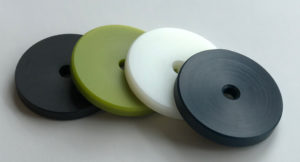Nylon sheets are quite common in the textile and plastics industries. Since the material is so versatile, it’s available in many different forms. Nylon 6/6 is one variation that basically all companies that utilize performance plastics should be aware of.

Here’s a guide to nylon 6/6, what sets it apart from other nylon sheets and how it stacks up against other plastic materials.
What Is Nylon 6/6?
In general, nylon is a common thermoplastic that offers a good balance of strength and toughness. Because of its various high-performance properties, it is useful in a huge array of industries and applications. It also comes in a variety of forms based on varying chemical structures. So nylon 6/6 is just one variation that falls into the overall category of nylon sheets.
More specifically, nylon 6/6 is a type of polyamide within the nylon family. It is made up of two separate monomers that each contain six carbon atoms; this is how the variation gets its name. Because of this balanced chemical structure, nylon 6/6 is one of the strongest types of nylon plastics. It is even able to hold up in a wider range of temperatures and humidity or moisture levels than some similar materials. Nylon 6/6 and nylon 6 are two of the most popular types of nylon sheets that are currently available from plastic suppliers today.
In addition to nylon 6/6, other variations of nylon sheets include nylon 6, which has a similar chemical structure and makeup to nylon 6/6, and nylon 5/10 and nylon 6/12. The latter two materials also offer high-performance properties and a different molecular structure, but these tend to be more difficult to produce and are thus not as commercially available.
Then there are variations in how the nylon plastic is formed. Nylon extruded is a moldable, general-purpose nylon. And nylon cast is a thermoplastic resin that can be added to molds. Both cast and extruded nylon can be made from nylon 6 or nylon 6/6 or other chemical structures. Cast nylon offers all the basic properties of standard nylon sheets. However, due to the slightly more complex machining process, it is often preferred when shorter runs are being produced. On the other hand, extruded nylon is often preferred for products or parts with extended production cycles. It offers many of the high-performance properties of nylon sheets, including temperature and impact resistance, but it can be prone to moisture absorption.
Benefits and Attributes of Nylon Plastic Sheets
Nylon is known for offering a wide range of high-performance properties that make it suitable as a replacement for other materials outside the plastics category, including metal and rubber. Some of the attributes that make it an ideal choice over these materials include its easy machinability, strength, and durability. It is also generally lighter than these options, though not more lightweight than many other performance plastics due to its strength and density. Here’s a deeper look at some of the properties that make nylon 6/6 sheets stand out.
Nylon is one of the original engineering thermoplastics, which means that it can easily be shaped and molded with heat. The exact process varies depending on whether you choose cast or extruded nylon. However, all sheets are generally easy to machine with various methods like cutting and routing after they are produced. This quality allows nylon 6/6 to offer a truly versatile set of properties and forms.
Nylon 6/6 is perhaps best known for its strength and stiffness. It is resistant to damage from both impact and friction. It is even resistant to many chemicals. So it can hold its shape well and continue offering high-performance benefits even in harsh industrial environments.
Nylon Material Properties
Overall, nylon 6/6 is a strong, stiff plastic that is well-suited for industrial settings. It can even be used to replace metal bushings and rubber machinery components. Due to its density and performance, nylon parts can absorb vibrations and prevent friction between other pieces of machinery, allowing them to last longer and continue operating at optimal efficiency.
Nylon can also meet many high industry standards and regulations, specifically, many extruded and cast grades are compliant with FDA, USDA and 3A-Dairy standards. So it can be used in machinery or handling equipment that deals with food and beverages. Its chemical resistance also allows it to be used in chemical handling facilities or areas where solvents may need to be used.
As for its physical form, nylon 6/6 can be shaped into rods, plates, and tubes. And it can be purchased in various grades based on the specific needs of each user. For example, they can be heat stabilized for use in areas with extreme temperature shifts, or lubricant filled for applications that require easy movement of parts.
If you’re interested in exploring the benefits of nylon 6/6 for your industrial applications, contact Polymershapes to learn more. Our local facilities can meet your nylon needs with sheets, rods, and tubes available in both standard and custom sizes. In addition, we provide a variety of value-added services like conversion and fabrication capabilities to give your firm a competitive advantage. Our experienced team members can also help you understand the various qualities of nylon 6/6 and other high-performance plastics, helping you make informed material selections that suit your specific applications and company goals. Visit our website to contact your local Polymershapes facility today.
